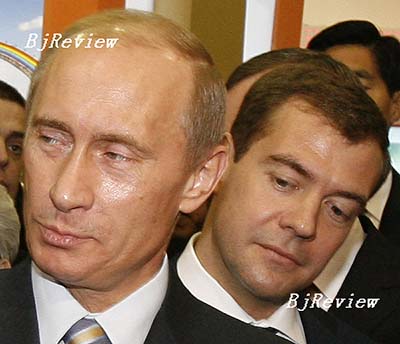|

Critics of Russia’s current administration under President Vladimir Putin have been puzzled about who would become the leading candidate in country’s presidential election in March 2008. In early December 2007, the question was answered when Putin nominated First Deputy Prime Minister Dmitry Medvedev as the candidate for the pro-Putin ruling United Russia party. Since then, critics have been wondering where Medvedev, as president, would take the country.
King of the hill
Candidate Medvedev will likely win the election hands down, foreign affairs experts said, not only because Putin supports him, but also because United Russia is backed by the country’s other three major parties-A Just Russia, the Agrarian Party and Civil Force. If Medvedev wins the election, the next Russian Government will follow
Putin’s agenda for the country, and Putin himself will continue to pull the strings behind the scene, they said.
At a United Russia Party congress on December 17, 2007, Putin hailed him as the “best choice” in the country’s presidential election. Putin promised that he himself would become prime minister under Medvedev and that the powers between the president and the government would remain unchanged.
Putin is very popular among the Russians, because of his efforts to improve the country’s international power and influence in the world. His stance on the presidential election is very crucial, said Shi Ze, Director of the Center for Security Studies of Surrounding Areas and a senior research fellow at the Chinese Institute of International Studies (CIIS). He pointed out that 40 percent of those surveyed in a recent poll in Russia said they would vote for any candidate Putin selected.
With the backing of Putin and the country’s four major political parties, Medvedev is standing on the Kremlin’s doormat. The four parties’ seats cover about 75 percent of Russia’s parliament. With such strong support, Medvedev has an 80 percent to 90 percent chance of winning the presidency, Shi said.
Wang Lijiu, a researcher with the Institute of Russian Studies at the China Institutes of Contemporary International Relations (CICIR), said that as first deputy prime minister, Medvedev has made great achievements in improving people’s living conditions while he has been in charge of the economy and social development affairs covering public health, education, housing and agriculture during the past years.
“He received high public praise from the people,” Wang said.
Putin’s political opponents previously had supported other candidates, such as Sergei Ivanov, also the First Deputy Prime Minister of Russia, and Russian Prime Minister Viktor Zubkov. But support for them died down for several reasons after Putin decided to back Medvedev, Wang said.
First, Medvedev, an energetic 42-year-old, is younger than the other two candidates who are in their 50s and 60s. “The age advantage is very convincing to the voters, because they need a strong leader who can implement continuous policies,” Wang said.
Second, Medvedev has a close relationship with Putin after working with him for 17 years. Putin has fully acknowledged Medvedev’s outstanding ability and insight as a leader.
“If leaders have privity between them, their cooperation will be better,” Wang said. He added that their relations become even more important given that the Russian Constitution will not be amended to enlarge the prime minister’s powers.
Third, Medvedev, who used to be a law professor, will push for the additional legislative reforms that are necessary for the country now that it has recovered its economic strength. These will enable the country to peacefully get through the transition between Putin and the next president.
Fourth, Medvedev has been first deputy prime minister since 2005. He is very experienced in dealing with all kinds of affairs on a comprehensive level, which is a key requirement for presidents. He also has maintained good relations with top officials in various government ministries. Medvedev also has shown himself to be capable of mediating conflicts and maintaining good connections among government ministries.
Fifth, Medvedev is a “liberalist” with no military or security background. He would easily be accepted by different political parties in Russia, as well as by other Western countries, Wang said.
| 